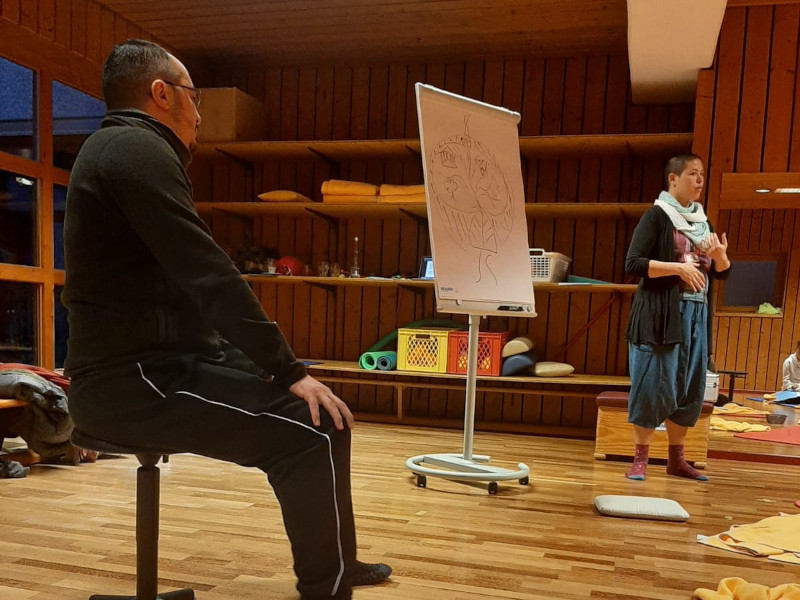Facilitator training
 We offer training to become a facilitator for Circular Breathwork. We work with institutions and also hold open trainings for individuals.
We offer training to become a facilitator for Circular Breathwork. We work with institutions and also hold open trainings for individuals.
NEXT OPEN TRAINING: Starts in November 2025! In-person dates: Nov 29-30 // Jan 16-18 // March 27-29. Details below. Please get in touch if interested.
CURRENT OPEN TRAINING: February-June 2025.
After completing this course, you will be able to give individual sessions to clients and support them with integration. You will also be able to guide larger groups together with fellow facilitators (we recommend a facilitator to breather ratio of 1:3).
Our program consists of 150 hours of training in the following format:
- 7 days of in-person training split into 3 blocks (2, 2.5 and 2.5 days, respectively)
- Block 1 focuses on self-experience.
- Block 2 focuses on basic facilitation skills.
- Block 3 focuses on advanced facilitation skills and continuous learning.
- 5 facilitation practice sessions to complete after Block 2. For each session, you will receive individual feedback based on a written reflection you send us.
- 6 online lectures about (1) facilitator ethics, (2) neuroscience of breathwork, (3) psychology of breathwork, (4) breathwork and trauma, (5) history of breathwork and complementary breathing techniques and (6) music for breathwork.
- 3 online gatherings for intervision and feedback about the practice sessions.
The teaching language is English. Location is the Alte Seilerei in Frankfurt, Germany. Lunch and snacks are provided for the in-person training days.
The training fee is 2750 Euros per participant. If this is beyond your means, please do let us know and we will try to find a solution that works for everyone! (if you are self-employed in Germany, the government has a financial assistance program called KOMPASS that you can apply to)

Our facilitator training is based on one fundamental principle: THE BREATH DOES THE WORK. Breathwork is fundamentally a self-healing practice, and the role of the facilitator is to help on the margins. Which does not mean facilitating is easy! Nor does it mean that it is not impactful and useful. Rather, it is the deliberate position we facilitate from. From this central principle, we base our training on the following six pillars:
1. Self-experience: Doing breathwork yourself is the foundation of your general knowledge and personal growth, making you capable of holding space for others.
2. Technical skills: We practice skills from bodywork, voicework, to preparing music. These techniques help breathers to break through, go deeper, stay grounded and work through difficult moments.
3. Constant self-development: Almost a third of the program is designed to help you open up, and grow comfortable with your own vulnerability, connection and discomfort.
4. Empathy without entanglement: We strive to feel as much of what the breather is experiencing as possible, without becoming part of the experience and bringing in our own thoughts/feelings. The first three pillars enable this way of working.
5. Objectivity rooted in facts: We make explicit the distinction between personal experience, opinion or fact. When possible, we refer to scientific or clinical studies.
6. Professionalism and ethics: We emphasize boundaries and consent in the work. And we outline the professional way to prepare for, conduct, and close a session, as well as providing aftercare.
